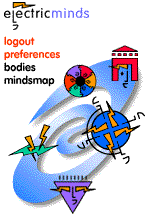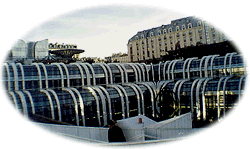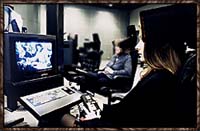
|

|
|
paris - annick morel
vidèothéque of paris
The Vidèothéque began in the early 1980s, as the brainchild of Pierre Emmanuel, a French poet and academician, who conceived the project as a way of creating a visual testimony of the urban transformation of the city; its human, architectural, cultural and sociological evolution. He managed to convince Jacques Chirac, a very good friend of his and the then-Mayor of Paris, to subsidize and complete the building of the Vidèothéque, which opened to the public in February 1988. Today the Vidèothéque, with 70 employees operates on a budget of 55 million francs (11 millions US dollars). In the course of achieving its initial goals, collecting and constantly expanding on the rich visual archives of Paris, it has also become an extremely innovative, lively, and magical place, offering the public a tantalizing kaleidoscope of programs and "tools for thought" for exploring the omnipresent role of images in our lives. A few telling figures prove the impressive scope of the Vidèothéque: It would take someone 18 months to watch the complete visual archives of the Vidèothéque today, assuming 8 viewing hours per days, six days a week! And during that same 18 month period, 400 to 500 new documents and films would have been added to the collection. The Vidèothéque of Paris has produced or co-produced 10% of the documents offered to the public. There is also a regular movie theatre with 4 screening rooms. Here, alongside feature-length films, one can also view short films and first films from young directors, which complete the large collection of "classics" by Tati, Renoir, Godard, Truffaut, Bunuel, Polanski, Malle, Chabrol, Rohmer, etc. Although originally it focused exclusively on matters relating to Paris, the programming is now enlarging its scope to urban phenomena in general. Michel Reilhac, General Manager of the Vidèothéque since September 1993, a passionate and very gentle man, with an impressive background in the management of cultural events and places, including dance and theatre, explains : "All cities in the world share an urban culture, and are now networked together. In the 21st century, half the world population will live in a cities. What has become the major cultural reference for people is not their nationality but whether they are urban or not. People from New York and Paris have more in common than French peasants and Parisians." For example, the present theme, "A nous deux la ville," is a selection of films dedicated to the individual experiences of people migrating to cities, and it offers a selection of no less than one hundred films from all over the world. Reilhac thinks it is essential in our urban, image-driven world to offer children and adults ways of understanding the complex messages that surround them. The choice of educational activities, special film festivals and events, workshops and discussions with professionals and directors, is impressive. As part of this educational concern for innovative technologies, the Vidèothéque opened its "Cyberport" a year ago. This in-house webcafé allows the public to discover the website, search its database of archives, or simply surf the web. A passionate observer and true believer in the virtues of the Internet, Reilhac has many ambitions regarding the Vidèothéque's web site and its future development : "Going to the U.S.A. a lot, I've been able to appreciate the fantastic development of the Internet. Today, we are redesigning our website, which has been very basic until now, as well as setting up an Intranet. I encourage everyone who works here to use it as a working tool. We are also working on a collaborative Internet project which will showcase the cultural riches of European cities through the development of a network which will foster interaction and creativity between residents of the different cities. With the Internet as their tool, these various groups of European citizens will draw upon their own emotions and cultural references in order to achieve a new form of electronic discourse." Doesn't such a concept ring a bell for the members of the Electric Minds community? |
shermozle said: Minitel really is an amazing device. The French government's foresight and laissez-faire attitudes to censorship should set an example for other world governments contemplating new technologies. Because Minitel is ubiquitous, it's still immensely useful. You can book trains, see what's on at the movies, chat--just about everything that you'll be able to do on the Web someday soon. But it's all there now in all it's coloured ASCII glory! Until everything is online and everyone has a terminal, we won't see the amount of usefulness you get from Minitel on the Web. Most Active Topics: Topic 1 Forum Announcements Topic 26 Ou je m'asseois Topic 14 French Film | |||
| ||||
Also in Paris: making history at france's new national library 36 15 fast money/scamming on minitel internet enters education nationale | ||||
|
|
|
electric minds |
virtual community center |
world wide jam |
edge tech |
tomorrow |
conversations
Any questions? We have answers.
©1996, 1997 electric minds, all rights reserved worldwide.
|





 Michel Reilhac, General Manager of the Vidèothéque since September 1993, a passionate and gentle man, with an impressive background in the management of cultural events and places...(photo by Quentin Bertoux)
Michel Reilhac, General Manager of the Vidèothéque since September 1993, a passionate and gentle man, with an impressive background in the management of cultural events and places...(photo by Quentin Bertoux)